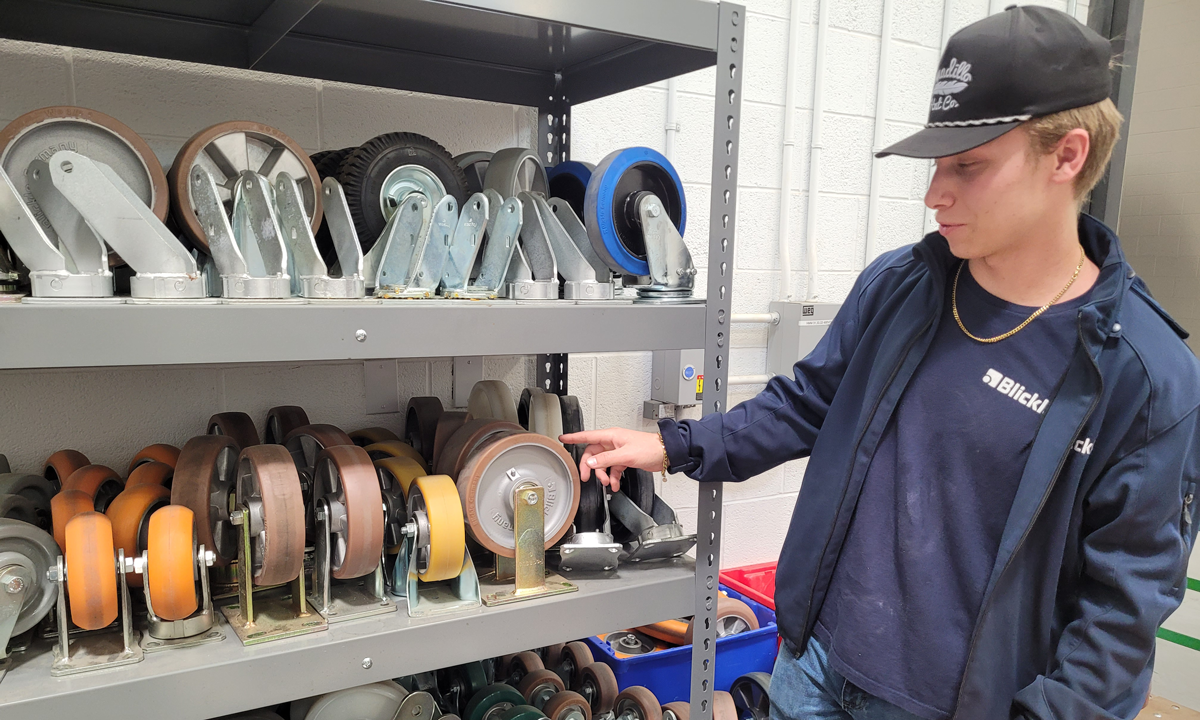Why Wait to Graduate? Georgia Apprentices Start Training as Sophomores
Apprentice program takes the lead from Germany and starts at 15, finishes by high school graduation.

Get stories like this delivered straight to your inbox. Sign up for The 74 Newsletter
Most 14 year olds in the U.S. are picking what classes to take as high school sophomores this time of year.
Walker Reese was picking the company where he wanted to launch his career.
Reese, now 19, had a huge head start on his career through a groundbreaking program: The German-inspired Georgia Consortium for Advanced Technical Training (GA CATT) starts students in Coweta County south of Atlanta as apprentices sophomore year, likely the youngest members of any apprentice program in the U.S. Other areas of Georgia are trying similar apprenticeships, just not as young as in Coweta County, where German-based companies have American plants.
By starting early, Reese finished his three-year apprenticeship as a maintenance technician as he finished high school last spring and walked into a full time job at Blickle Wheels and Casters in the city of Newnan.
“I’d consider myself much further ahead than most,” said Reese, who bought himself a new car and started renting a house soon after graduating. “One, I already have a degree. Two, I’m living on my own paying my own bills at 18…19 comfortably , and three I’ve gained knowledge and expertise that most won’t have until they’re mid to late twenties.”
“The people who waited until they were out of high school are a little behind now,” he added.
Apprenticeships — programs in which students are paid to train and work at the same time —- have been common in the U.S, for years in construction trades such as carpentry and plumbing. But apprenticeships in other fields like manufacturing have started to grow only in the last decade or so.
And apprenticeships in construction generally start after high school, which often leaves high school students in unpaid pre-apprenticeships or career technical education programs at their high schools. Even those CTE programs typically don’t fully start until junior year.
But in Europe, starting a path toward university or a career is standard by age 15. German-based companies like Blickle or the Grenzebach Corp., which have plants in Newnan, a town of 43,000 about 30 miles southwest of Atlanta Hartsfield Airport, think nothing of taking on students that young. By starting as sophomores, students can finish the three year program by graduation.
So German companies in the Newnan area partnered with the German American Chamber of Commerce and local CTE centers to launch the apprenticeships in 2016. Other areas of Georgia are starting to join the program, just at older ages. Though companies like the concept of apprenticeships, they still have reservations about starting students so young.
“We don’t start early because we (Americans) thought of starting early,” said Mark Whitlock, CEO of the Central Education Center of Coweta County, the school that handles much of the apprentice training. “We started early because the German companies said ‘this is the way we do it in Germany’ and that’s what they needed.”
Whitlock said a change in state law passed in 2015 plus some additional cooperation from the U.S. Department of Labor allowed younger students to work in manufacturing facilities as part of the program.
Scott Chahalis, CEO of Blickle USA, which started near Stuttgart, Germany, said it’s natural to have 15 year olds working in his building while also taking classes.
“They do this in Germany,” Chahalis said. “It’s not like they’re making necessarily a life altering decision, because they’re going to get their high school degree. Maybe they want to go to college. So go to college. You want to be a lawyer, doctor? Go. Go do that.”
“But you’re going to get out of the classroom, which is actually a big plus for many kids,” he added. “They’re not going to be in the high school classroom sunup to sundown. They’re going to have the best of both worlds. It is kind of exciting to come to this building, and basically be treated to the real world.”
He’s so happy with Reese, his first apprentice, that he’s adding two more.

For Reese, starting young was no issue at all, even if it meant shifting to a year-round program and losing summer breaks.
“It depends on the person and if they’re willing to make the mature decision to start young and sacrifice some summers to be successful in life after high school,” he said.
And he prefers hands-on work, so he was happier learning to adjust wheels with lathes or test how smoothly they can carry heavy loads than taking high school classes.
“I’m not a pen and paper type person or sitting and typing on a computer,” he said. “I feel like that’s harder on me mentally.”
So far, 34 students have started the program as sophomores. Many are still in the three-year program, but five have finished it, earning their diplomas and German manufacturing certifications. They have also earned credits toward associates degrees in precision manufacturing.
Other areas of Georgia are starting to join the program, though they have not made the leap to starting at 15, at least not yet. Solmax, a company that makes synthetic fabrics for environmental projects northeast of Atlanta, just added its first apprentice a year ago. But since company policy was to only let people over 18 work on the factory floor, they had him do personal training projects until he turned 18.
Wendy Davis, the company’s human resources director, said the company may relax its policy and start with juniors soon as CTE schools in the area add more training.
“You’ve got to remember, we’re still in the beginning,” Davis said. “So we’re learning as we go.”
Get stories like these delivered straight to your inbox. Sign up for The 74 Newsletter

;)
